If you are not redirected automatically, please click on the URL below.
ページが切り替わらない場合は、https://www.english.metro.tokyo.lg.jp/topをクリックしてください。

Please enable JavaScript to use the website of the Tokyo Metropolitan Government.
Updated on December 20, 2021
Main content starts here.
Ome Livestock Center reopened as facility with advanced hygiene levels
Last year, the Ome Livestock Center of the Tokyo Development Foundation for Agriculture, Forestry and Fisheries celebrated the 100th anniversary of the establishment of its predecessor, the former Tokyo Livestock Experiment Station.
Since most of the facilities were built in the 1980s, work efficiency was poor due to aging and outdated equipment. It also became necessary to strengthen quarantine systems because the quarantine facilities for livestock infectious diseases had become outdated. For these reasons, work to reorganize the facilities began in 2019. The new piggery and poultry houses were completed in March and started operation in March. In June, we gathered information about the newly renovated chicken area.
The chicken area is approximately 3,238 square meters. It is equipped with an automatic egg tester for hatching eggs, an automatic egg washer, and an automatic egg collection facility that all use new technology.
Before entering each area, you must wash your entire body in the shower booth, change into special clothes for that area, and sterilize any baggage you bring in by exposing it to ultraviolet rays in a pass box.
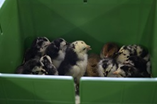 |
 |
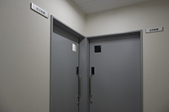 |
| Newly hatched purebred Shamo chicks. | The UV light sterilizes baggage entering the area. | Entrance to the locker room. |
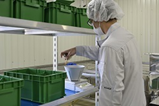 |
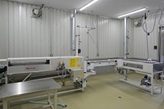 |
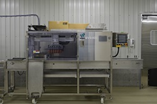 |
| Data is taken for each purebred Shamo, which is tagged on their ankle with a number and weighed. | An automatic egg washer has been installed. Egg washing had previously been done manually by staff. | Automatic egg tester. Unfertilized eggs are sorted out and removed using optical heart rate sensors. |
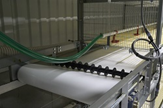 |
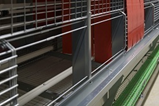 |
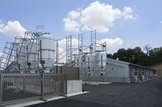 |
| After drying, manure is automatically carried out by the manure removal belt. | Laid eggs are automatically transported by the egg collection belt (green part). Eggs had previously been collected manually. | Feed is automatically sent from the outside feed tank to the feed tank inside the area and then to each poultry house. |
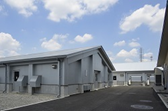 |
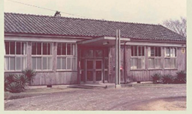 |
| Current modern barn. | The main building of the Kasumi Branch Station (calf breeding facility) in Ome City in 1976 |